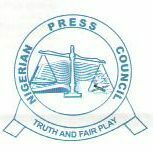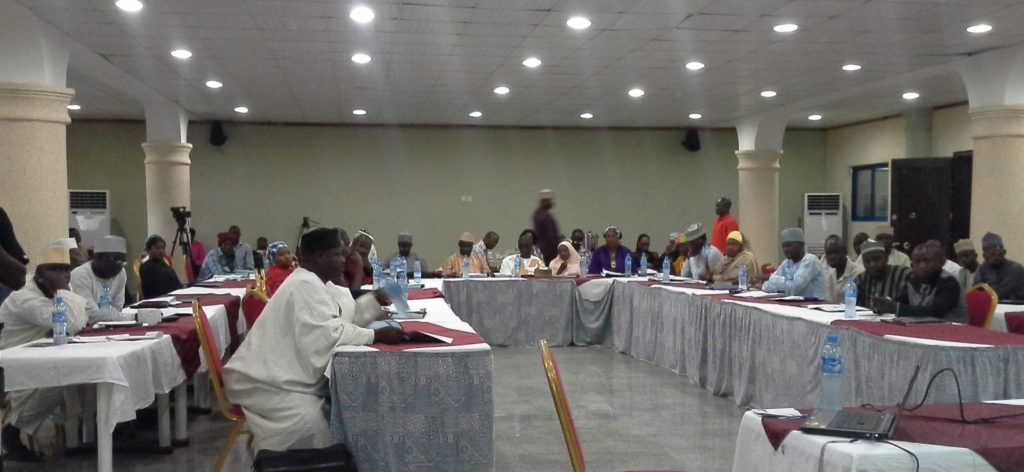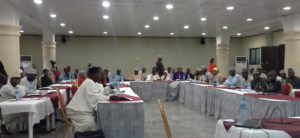MEDIA URGED TO COMPLEMENT AND HELP DRIVE THE DEMOCRATIC PROCESS – Hon. Bako
The media has been urged to complement and help drive the multi-process democratic development as we approach the 2015 general elections. The Hon. Commissioner for Information and Home Affairs, Kaduna State, Hon. Ben Bako made the statement today, Monday, September 15, 2014 in Kaduna while declaring open a two-day workshop on Effective Coverage and Reportage of 2015 General Elections. The workshop being organised by the Nigerian Press Council is with the support of the Democratic Governance for Development (DGD) Project II of the United Nations Development Programmes (UNDP) and other donors such as the European Union, UKaid, Canadian International Development Agency, Korea International Cooperation Agency.
The Commissioner stated that the dynamic spirit of the Nigerian Press has been an invaluable asset to the strengthening of democratic culture in the country, particularly in regard to the coverage of electoral processes.
Mr. Bako said that ethical conduct and effective coverage by the media will be very crucial to the overall success of the general election.
The Hon Commissioner who also declared the workshop open appealed to the general public to guard their utterances as we approach the election year. He cautioned that provocative comments can overheat the polity and undermine the effort to achieve a peaceful and credible electoral process. He posited that Nigeria as a nation has experienced lots of violence in the past arising from election and that there is an urgent need to put a stop to this.
He spoke on the efforts of the Kaduna State government towards ensuring an effective coverage of the 2015 general elections. This, according to him is being done by the strides of the state government at repositioning its media corporation for effective and efficient service delivery ahead of the elections. In addition, is the state effort at sensitizing the public to be security conscious in order to create awareness on harmonious co-existence among the people.
The Hon. Commissioner, who also highlighted the mandates of the NPC, said that its responsibilities put the Council in a very critical role of ensuring effective coverage of the elections b y the media.
The Workshop Chairperson, Tamani Yusuf, who is the Managing Director of Kaduna State Media Corporation in her remarks said that the workshop was timely and points to the importance of the media as the “fourth pillar of power” and its duty to provide citizens with information on current political issues among other things. She stated that it is a truism that the media plays an indispensable role in the proper functioning of democracy. Speaking further, she said that apart from the media’s “watchdog” role, it can also play a more specific part in enabling full public participation in elections, not only by reporting on the performance of government, but also in other ways, such as by educating the voters on how to exercise their democratic rights; and reporting on the development of the election campaign. Other are by providing a platform for the political parties to communicate their message to the electorate; allowing the parties to debate with each other; and by scrutinizing the electoral process itself in order to evaluate its fairness, efficiency, and probity, etc.
She posited that the media does not only reflect the political environment but is the political environment itself.
Earlier in his welcome remarks, the Acting Executive Secretary, Nigerian Press Council, Mr. Nnamdi Njemanze underscored the importance of the workshop as he stated that Nigeria is at the threshold of the 2015 general elections and there is need to take stock and to devise ways of entrenching democratic principles and culture in the country in a way that the citizens will benefit from good governance and enhanced service delivery as never before.
The Acting Executive Secretary said that the period of elections is the time for citizens to take full advantage in two main universal principles of human rights: The right to freedom of opinion and expression and the adult right to vote and be voted for to their leaders. He stated that the media is not only challenged about its duties, or obligations in the Constitution, it should be mindful of the guidelines in the Electoral Act and the Code of Ethics of Journalism as the compass for monitoring the electoral process.
The plenary session of the brain thrust commenced with a paper by Prof. Umaru Pate titled “Reporting Elections’ Results and Resolution of Election Disputes”. Dr. Sola Adeyanju who represented Prof. Pate in the delivery of the paper explored the role of the media in the coverage of Elections and the hazards and barriers Journalists should note in reporting elections in Nigeria.
The paper also dealt extensively on the subject of media ethics, including the electoral guidelines to be observed in reporting election results.
“Ethical Considerations in the Coverage of 2015 Elections” was another paper presented at the workshop. It was presented by Samson Aiyenigba Fagbemi of the Department of Mass Communication, Kaduna State Polytechnic, Kaduna. Mr. Fagbemi in his presentation examined the abuses of professional ethics in political reporting. He listed the common abuses as excessive materialism, sycophancy, nepotism, character assassination, poor leadership, indiscipline, sensationalism and deviation from the truth.
He further spoke on the reasons for violations of professional ethics and enumerated important elements that should guide the journalists in the course of their political news reporting.
The workshop which enters its second day on Tuesday, September 16, 2014 has as its objectives the sensitization of journalists on ethical principles guiding election reporting and coverage; strengthening the capacity of journalists to monitor elections and report them effectively; and to ensure adherence to professionalism as a deliberate means of entrenching democracy and by extension good governance in Nigeria. The forum which is the third in the series of workshops for journalists to be held in the six-geopolitical zones of the country, is organised for journalists from the North-West states of Jigawa, Kaduna, Kano, Katsina, Kebbi, Sokoto and Zamfara.


